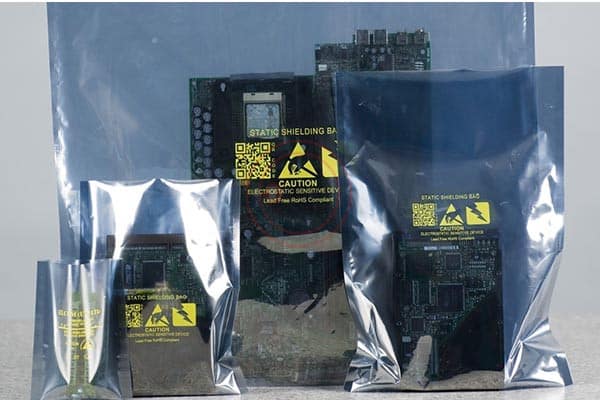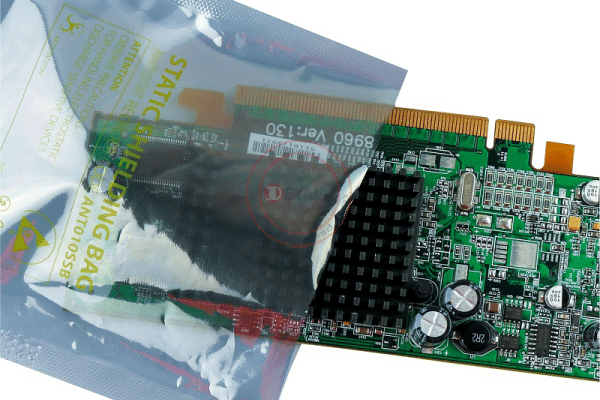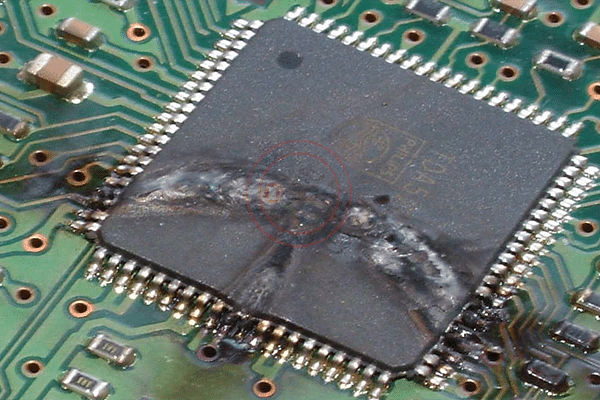My SSD Came with No Anti-Static Bag: Is This Fine?
You’ve just unboxed your new SSD, but there’s no anti-static bag. Should you worry about static damage?
It’s not ideal, but it’s not a disaster if handled carefully. Without an anti-static bag, your SSD is exposed to ESD risks, but proper precautions can minimize damage.
What is Anti-static Bag ?
An ESD (ElectroStatic Discharge) shielding bag is specialized packaging designed to protect electronic components (like SSDs) from static electricity, environmental moisture, dust, and electromagnetic interference (EMI). Here’s how it works to safeguard your SSD:
| Layer | Composition | Function |
|---|---|---|
| Outer Layer | Metallized polyester | Reflects electromagnetic waves and shields against external static fields |
| Middle Layer | Conductive metal (e.g., aluminum) | Creates a Faraday cage – blocking external static charges |
| Inner Layer | Anti-static polyethylene | Safely dissipates static inside the bag without sparking |

How It Protects Your SSD?
① Static Shielding (External Threats)
- Faraday Cage Effect: The metal layer forms a conductive enclosure around the SSD. Any external static charge (e.g., from clothing, carpets, or tools) flows around the bag’s surface instead of penetrating it.
- Example: Touching the bag with static-charged hands? The shock never reaches the SSD inside.
② Static Dissipation (Internal Threats)
- The bag’s inner layer safely neutralizes static generated inside (e.g., from friction during shipping) by channeling charges to its conductive layer.
③ Physical & Environmental Protection
- Blocks moisture, dust, and corrosive gases.
- Shields against electromagnetic interference (EMI) from phones, routers, or power cables.
Why Did My SSD Come Without an Anti-Static Bag?
Missing bags raise questions. Did your SSD skip a key protection step?
Some manufacturers omit bags to cut costs or assume safe shipping. Retail packaging or pre-installed units may not include them, relying on other safeguards.
Manufacturer Choices
Budget brands may skip bags, betting on cardboard or foam. I’ve seen premium SSDs arrive bag-free if pre-installed in devices, reducing perceived need.
Shipping Factors
Static-safe boxes or padded envelopes can replace bags during transit.
When to Be Concerned
If the SSD was loose or shipped in humid conditions, risks rise. Check for manufacturer notes on packaging standards.
How Does Lack of an Anti-Static Bag Affect SSD Safety?
No bag leaves your SSD vulnerable. Can static still harm it during handling?
Without a bag, static charges from your hands or environment can damage the SSD. The controller and NAND chips are sensitive to ESD.
ESD Damage Potential
A 100V discharge can fry circuits. The SSDs fail from mishandling post-unboxing, even with no visible spark.
Latent Damage Risks
Subtle damage might not show immediately, causing data errors later. Clients learned this the hard way with failed drives.
Comparison Table
| Protection Level | Risk of ESD Damage | Typical Outcome |
|---|---|---|
| With Anti-Static Bag | Low | Safe handling |
| Without Bag, Careful | Medium | Possible latent damage |
| Without Bag, Mishandled | High | Immediate failure |
What Are Safe Handling Practices Without an Anti-Static Bag?
You can still protect your SSD. Are you ready to handle it safely?
Ground yourself, use non-static surfaces, and avoid carpets. These steps reduce ESD risks until you secure proper protection.

Grounding Yourself
Touch a grounded metal object before handling. Always use ESD workbench’s ground point to discharge static.
Ideal Surfaces
Work on a ESD table. Avoid synthetic fabrics or rugs, which generate charges.
Step-by-Step Guide
- Power down and unplug your PC.
- Ground yourself on static discharge grounding point.
- Handle the SSD by edges, not chips.
- Place it on a non-static surface.
- Install quickly to minimize exposure.
Should I Contact the Manufacturer About the Missing Bag?
A missing bag might signal a problem. Should you reach out?
Yes, contact them if unsure about warranty or quality. It’s your right to verify ESD protection standards were met.
When to Act
If the SSD lacks any ESD labeling or feels poorly packed, ask manufacturer to report issues to ensure compliance with IEC 61340-5-1.
What to Ask
- Confirm ESD handling during shipping.
- Request a replacement bag or credit.
- Check warranty terms for ESD damage.
How Can I Add Anti-Static Protection for My SSD?
You can upgrade protection yourself. Want to shield your SSD moving forward?
Use anti-static bags, mats, or wrist straps. These tools create a safe environment for storage and handling.

Affordable Options
- Anti-Static Bags: $1-5 for reusable packs.
- ESD Mats: $20-50 for workstations.
- Wrist Straps: $5-15 with grounding cord.
Installation Tips
Store the SSD in a bag when not in use. Cutting ESD incidents by 20%.
Long-Term Benefits
Proper protection extends SSD life. Avoid failures with these simple additions.
What Are the Signs of ESD Damage on an SSD?
Damage might not be obvious. Can you spot ESD issues on your drive?
Look for boot failures, data errors, or performance drops. These signal possible ESD damage.

Common Symptoms
- Slow read/write speeds.
- Corrupted files or partitions.
- Complete drive failure.
Testing Methods
Use diagnostic tools such as CrystalDiskInfo to monitor devices in the early stages of failure, thereby maximizing data preservation.
Action Steps
If suspected, replace the SSD and report to the manufacturer.
Conclusion
An SSD without an anti-static bag isn’t automatically doomed, but it’s at risk. Handle it carefully, ground yourself, and consider adding protection. My ESD expertise shows proactive steps prevent costly failures, ensuring your data stays safe.



